
Guests
- Robert McChesneymedia analyst and professor at the University of Illinois at Urbana-Champaign in the Department of Communication. He co-founded Free Press.
On Wednesday, Facebook CEO Mark Zuckerberg met with top conservative media figures, including Glenn Beck, Dana Perino and Tucker Carlson, after his company was accused of suppressing news stories on political grounds. Former Facebook workers told the website Gizmodo they routinely suppressed news stories of interest to conservative readers by keeping them out of the “trending” stories section on the sidebar. “The concerns are legitimate,” says media analyst Robert McChesney, “but the real question is: Should we have a private monopoly that has so much political influence and political power?” McChesney also discusses Facebook’s surveillance and access to user’s data, and whether such companies could be nationalized.
Transcript
AMY GOODMAN: Bob McChesney, I also want to ask you about Facebook. On Wednesday, Facebook CEO Mark Zuckerberg met with top conservative media activists, including Glenn Beck; Dana Perino, the former Bush spokesperson; and Tucker Carlson. The meeting took place a week after Facebook was accused of suppressing news stories on political grounds. Former Facebook workers told the website Gizmodo they routinely suppress news stories of interest to conservative readers by keeping them out of the trending stories section on the sidebar.
ROBERT McCHESNEY: Well, it’s a real problem, in the sense that the issue here is the one that’s not being talked about, the elephant in the room, the two-ton elephant, which is Facebook is a monopoly, and they have monopolistic power, as do a number of these digital giants that are the largest companies now, in terms of market value, in the world economy. And so, what Facebook does, or Google or Amazon, has immense influence over how people see the world and understand the world. And so, the concerns are legitimate, if you feel you’re getting the raw end of the stick. But really, the real question is: Should we have a private monopoly that has so much political influence and political power? I think democratic theory is unequivocal on this point: no. This is really antithetical to anything remotely close to a free press and a free society.
Then, the other issue is, if you’re going to have this private monopoly, no matter how lovely you think the people are who run it or how much you trust them, how benevolent you might think they are, in our society, and most others, what you get is, the people or the squeaky wheel that gets their attention, that causes them to react, are powerful people. So it’s going to naturally gravitate to suiting the interests of those who can arrange a private meeting, who have big backers, who are politically and economically influential. I don’t think Facebook is holding meetings with homeless representatives to make sure their side of the story gets covered, or peace activists to make sure their side of the story gets covered. I doubt the boycott and divestment folks, that you talked about at the newscast here, across the country, with regard to Palestine and Israel, are getting their audience with Facebook, either. You know, it’s really slanted very heavily towards benefiting those in power, when you have a private monopoly that basically has uncontrollable power.
AMY GOODMAN: So what should happen to Facebook, do you think?
ROBERT McCHESNEY: Well, I think this is the great discussion of the next generation. There’s nothing on the table now. But as a society, we have to consider, as we move into this heavily digitized economy—and we have, you know, four, five, six companies that dominate it, and the largest companies in the world in terms of market value, and they’re privately owned, and they own the politicians—is this acceptable? And if it isn’t, where do we go from here? And I think that’s the great discussion we’re going to have, because the status quo isn’t going to work.
AMY GOODMAN: What about nationalizing?
ROBERT McCHESNEY: Well, that’s certainly the traditional method. And—
AMY GOODMAN: What does that mean?
ROBERT McCHESNEY: What that means is that if you have a company so big that you can’t allow it to exist, but it’s in an industry where it can’t be broken up—you can’t break it into 12 competing parts; because of networks and economics, it gravitates towards being a monopoly—you take it out of the market system, like you have the post office outside the market system, not a private monopoly. And you take it so it’s not a source of profit making. You make it municipally run, generally nationalized in some form. And then it not only benefits the society as a whole, but it benefits smaller businesses, that aren’t getting ripped off by these monopolies to pay much higher rates for their services than they would have to pay otherwise.
AMY GOODMAN: What about surveillance?
ROBERT McCHESNEY: And that’s another issue.
AMY GOODMAN: How much Facebook knows?
ROBERT McCHESNEY: Yeah, exactly, and that’s another issue. We’ve got these digital companies, aren’t just monopolies in the sense that a train company is, but they’re a monopoly in the sense that they actually are doing surveillance. They have all the data on all of us. And they have a very strong interest in being on good terms with the federal government and the national government. They’re really joined at the hip. And the national government, once you get away from election time and once the door closes, has a real clear record of not being especially interested in civil liberties of citizens. That seems a nuisance that gets in the way of their doing their job. And that’s another reason why, you know, this is a marriage that is not made in heaven for democracy.
AMY GOODMAN: How could Facebook manipulate a presidential race or political race?
ROBERT McCHESNEY: You know, I’m not a—I’m not comfortable speculating on that, although, as you know, I’m comfortable speculating on a lot of things. But, you know, I think that it’s possible. I mean, it just takes very subtle things, and maybe not even always intentional, can have a great deal of influence. One thing they do, though, is simply by regurgitating existing journalism. They’re regurgitating the stories that are coming down the pipe from the mainstream media, which are largely—the problems in there then become amplified and become the problems worldwide. That’s how people see issues. And so, it just—it’s a megaphone for our worst problems in our journalism.
AMY GOODMAN: I want to talk about some other media news. Charter Communications announced Wednesday it’s completed its acquisition of Time Warner Cable and Bright House Networks, creating the second-largest U.S. broadband provider and third-largest pay TV provider. Talk about the significance of this. This is your specialty, media consolidation.
ROBERT McCHESNEY: Yeah. Cable companies and telephone companies and cellphone companies, they—these companies all are really government-created monopolies. These aren’t free market companies that were tinkering in the garage out in Palo Alto, and they came up with a great idea, and they lucked into a monopoly. These are companies that, from the beginning, have gotten their power by having the best lobbyists in town and getting government monopoly licenses, not having any competition. They’re monopolies by nature.
And so, we’ve really gravitated to a point—this is where the sort of crony capitalists and the corruption of our system becomes so transparent, where these companies have gobbled up all the licenses, they’ve gotten rid of many of the regulations that prohibited concentration, and now we have two companies, Charter and Comcast, which are going to have—about two-thirds of all landline broadband internet access is going to go through those companies, and close to that in terms of cable television access, as well. And this is something, again, antithetical in our entire history, until quite recently, that you’d allow these sort of companies this much power. When we say they have two-thirds, it’s not like you have an option. That means in two-thirds of the country, they’ve got a monopoly. They’ve divided up the country between themselves. They’re not competing with each other. And again, similar to the Facebook—it’s just slightly different, because in this case you’re dealing with purely government-created monopolies.
But for the representative of the people to allow there to be even more concentration in this industry, there’s no economic justification, except for the shareholders of these companies. There’s no benefit for the citizens of this country to do this. It’s just a textbook case of tremendous lobbying. And these guys, the most important—their competitive advantage in economics is they’ve got the best lobbying in the world. That’s it, period. It’s not that they serve consumers well. And these guys have got great lobbyists. I’m sure they’re all getting huge bonuses this year for pulling off this deal.
AMY GOODMAN: So what do you think should have happened?
ROBERT McCHESNEY: We should have prohibited it. And I think we have to really have a serious discussion in this country about why do we pay so much more for broadband access and cellphone service than almost any other country in the world, sometimes by double, triple the rates for crappier service. Is having these private companies, which are the equivalent of the health insurance companies, gouging us and setting super high prices and paying off the regulators and politicians, a very rational way for a free society to have the central component of our communication infrastructure controlled?
AMY GOODMAN: Your report card on President Obama when it comes to media policy, and how it compared to President Bush?
ROBERT McCHESNEY: Oh, boy, that’s a low bar you’re giving me right there. Well, he’s better than President Bush—there’s no question about that—in many respects. It’s been mixed. I think it was a low priority for him. He got elected in 2008 running on a very progressive platform, which he pretty much largely forgot. Especially his first term, the FCC was run—produced a backwater that basically didn’t want to make any waves and didn’t want to ruffle any feathers. The second term, under the current head, Wheeler, implemented a great net neutrality policy, much to their credit, has been good on some of the mergers to stop them, but still had to throw—threw a bone here to Charter with the Time Warner merger. So I’d say better, but still a disappointment. I think for someone who ran in 2008 really with a very progressive platform on the internet, on public media, on media consolidation, on community media, he’s basically dropped the ball.
AMY GOODMAN: Well, I want to thank you, Robert McChesney, professor at University of Illinois, Urbana-Champaign, in the Department of Communication, co-founded Free Press, a national media reform group. And Bob McChesney and John Nichols recently co-wrote the book People Get Ready: The Fight Against a Jobless Economy and a Citizenless Democracy.
This is Democracy Now! When we come back, Democracy Now!'s Mike Burke goes into a Chicago church where a Mexican immigrant has taken refuge after living in this country for more than 16 years. He has five U.S.-born children. He's trying to prevent his deportation to Mexico. Stay with us.

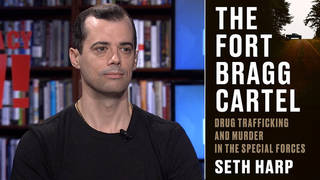
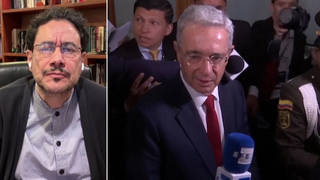

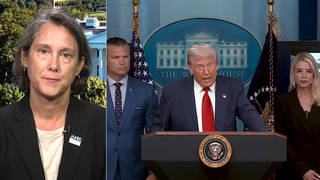





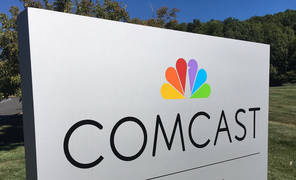

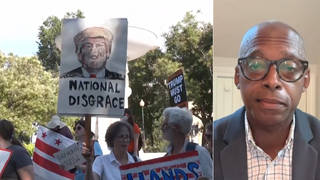
Media Options